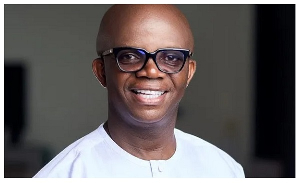James Agyenim-Boateng received and read the texts during the Radio Gold March 25, 200 ?60-Minutes? programme. ?We want your guest to hit payola beneficiaries hard!? someone texted. ?Your guest is right. Payola DJs are killing musicians to the bone,? and several others.
What is Payola? As far the Ghanaian music industry is concerned, it means accepting payment or demanding money from a music producer or musician in order to play his or her music on a radio station. It goes without saying that if the producer or musician doesn?t part with money demanded, no one will hear his song on the airwaves, as a result of which he cannot market his album.
Payola is a common feature of the music industry in all parts of the world, but in countries like Britain and America it is considered a criminal offence. It is a punishable offence because it gives unfair advantage to only those who can pay to get a slot on the airwaves even though their productions might not be better than that of those who cannot pay. It does not make for fair competition.
When James hosted the 60-minute programme, his guest, Faisal Helwani, a pioneer music producer and promoter gave insight into ways Payola is destroying Ghana?s music industry. We bring you excerpts of this important interview monitored by ?Spectator Arts.?
HOST: Yes we do
FAISAL: So people even pay radio stations not to play my music?The mafia controls the industry. I have over 25 albums on the shelves at Koala and nobody ever hears them over the airwaves so they are not selling.
HOST: Don?t you think if your music is good it will naturally sell.
FAISAL: The music is good, good lyrics and all but it is not selling because the radio stations are not playing them. I have sent to Radio Gold 14 CDs and I?ve never heard one of them being played. All I hear is hiplife. DJs are paid not to play my music.
HOST: We might not be playing your music, but that doesn?t mean we are paid not to play your music.
FAISAL: The problem is that some DJs are managers of hiplife artistes, and if you don?t belong to their label, then you don?t get airtime. That is why we keep hearing one song over and over again. The other day your station played hiplife for four hours?I have no problem with anyone managing any artistes, but when you use your official position to eliminate other artistes from the airwaves, that I won?t tolerate.
HOST: So you have problems with DJs
FAISAL: Most of them. There are some humble ones who play your music without asking you for money.
HOST: Can you name some of the humble DJs?
FAISAL: If I have to name the humble DJs, then I?ll also mention the criminal DJs. What we need is to liberate the tool of competition which is the airwaves and make it available to all artistes, not to only those who can pay or who are managed by Payola DJs.
HOST: There is one DJ who says you?ve been continually peddling lies about him. (This question came up after a caller asked Faisal why he has always been accusing Kofi Okyere Darko).
FAISAL: I don?t always accuse him, but whenever I get the opportunity, I do. I do because he once invited me to Radio Gold and set me up with Fiifi Banson and the rest to make mince meat of me but they failed. Another time they set me up again with Bola Ray at Top Radio to make mince meat of me.
HOST: He says he has not taken money from anybody.
FAISAL: I was there! Teddy Osei borrowed the money from me. And they didn?t even play the music. They played it once or twice and stopped. (The DJ in question happened to enter the studio during the last part of the interview and had the opportunity to fire back).
DJ: The last time, Faisal said it was 10 million cedis. Now it is 5 million cedis so which is which?
FAISAL: It was not 10 million cedis. That?s a lie. It was 5 million cedis. (The truth can only be told by Teddy Osei and nobody else. Earlier the host asked questions on Copyright and Gamugram).
FAISAL: The money got from the sale of banderoles and hologram in years past went to COSGA to benefit the Society and its members. But that of Gamugram today is only benefiting individuals because Gamugram is registered in private names and not in the name of the Copyright Office, COSGA or government.
HOST: Can you prove it?
FAISAL: I have the registration certificate. Gamugram is registered as a company in the name of certain individuals, and the monies from Gamugram are shared between these individuals and are not accounted for to government. It?s not benefiting composers in any
way.
HOST: Do you put Gamugram on your products?
FAISAL: No way! No individual can organize anti-piracy on behalf of anybody. Every copyright owner can give power of attorney to the police or an agency to organise it on behalf of all artistes and the money accrued from Gamugram goes to the state for this purpose, then that is legal and we can all support it. Now when anti-piracy activities are organised, we hear cassettes hawkers being arrested. The question is what happened to the manufacturers of the pirated cassettes? We must know the Godfathers behind such illegal activities and not just mere hawkers who are only pawns.
HOST; So you have a problem with Gamugram
FAISAL; Yes, because it is not benefiting producers or musicians or the music industry as a whole, but only click in the industry. The Copyright law must be changed.
















